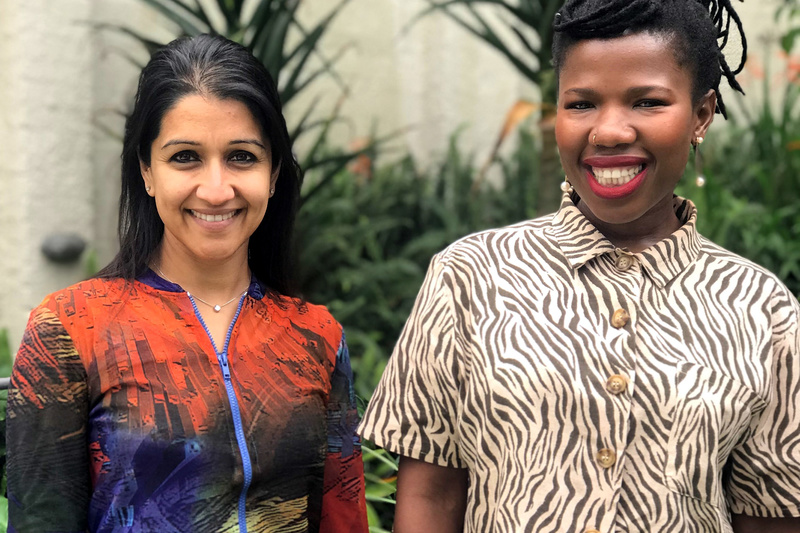Ameeta Jaga – Equality, Diversity, Inclusion
04 November 2021 | Story Robert Morrell. Photo Yara Jaga. Read time 6 min.
Ameeta Jaga is an associate professor in the Section of Organisational Psychology in the School of Management Studies in the University of Cape Town’s (UCT) Faculty of Commerce. She has been developing her interest in Southern theory, exploring interdisciplinary methodologies and leading a major breastfeeding-at-work research project.
Ameeta trained in dance and fine art and it is possibly this training combined with her interest in critical management studies that has produced a flexible body and a flexible mind. In the last few years she has been exploring and exceeding the boundaries of her discipline in organisational psychology by asking probing questions about how people in the global South understand their lives and how researchers, in turn, produce situationally helpful analyses.
“My introduction to Southern theories through the New Generation Professoriate (NGP) Southern theory reading group helped me to see global knowledge inequalities in my field. I then tried to develop new research agendas, new concepts and reframe research questions.”
Southern theory and COVID-19
In June 2021, Ameeta was invited to present a keynote for the Equality, Diversity and Inclusion track at the 19th International Labour and Employment Relations Association (ILERA) World Congress hosted by Lund University in Sweden. The conference theme was ‘Making and Breaking Boundaries in Work and Employment Relations’.
Her keynote was titled “Rethinking Work-Family Boundaries in a Time of COVID-19: Organisation, Permeability and the Global South”. Her presentation critiqued the approach of boundary management to work–family relations. This approach is designed to achieve order and has been used extensively in the time of COVID-19.
Ameeta offered an alternate perspective: sense-making in conditions of boundary chaos. She argued that plural perspectives, derived from distinct realities in diverse contexts, can coexist to expand ways in which individuals navigate work, family, and employment. Her conclusion was to call for scholars working in the area of work, family and employment to bridge boundaries and thus strengthen the North–South dialogue. This will advance equality, diversity and inclusion and assist with the recovery from the COVID-19 pandemic.
Work-family methodology
Ameeta has teamed up with Tim Guetterman, the University of Michigan’s Medical School’s Department of Family Medicine to publish a paper titled “The value of mixed methods work-family research for human resource management: a review and agenda” in the International Journal of Human Resource Management. They highlight the ability of mixed methods research to deepen the understanding of work-family issues in diverse, multinational contexts. They argue that policies addressing work-life balance that apply to individuals and their families in North American and European cultures often don’t work well for employees located in other contexts with different family environments. They suggest that a mixed methods approach is important at a time when companies are responding to challenges generated by the ongoing COVID-19 pandemic. They recommend that HR managers can reduce bias in policies meant to improve work-life balance of employees if they heed the findings generated by mixed methods research.
Bongekile Mabaso’s achievements and reflections as a PhD student
Bongekile Mabaso is researching for a PhD with Ameeta. Her work explores breastfeeding practices in the workplace. She entered a video in a competition for postgraduate students organised by UCT’ SDGs Africa Summit 2021. Her entry was placed in the top three of the category, #TheAfricaWeWant. The three-minute video focused on why supporting breastfeeding is an important societal issue and how workplaces can better support working mothers who wish to combine breastfeeding and paid work.
Bongi writes about her PhD journey thus far:
“It has been an amazing opportunity to explore my interests in child and maternal health within the work and family interface. Centring people’s lived experiences and contextual specificities has not only enriched my research but also developed me as a person.”
“The hardest part of my PhD journey was difficulty articulating and navigating the systematic racism that is rife in Cape Town. Having a considerate and compassionate supervisor helped me navigate my struggles. I am grateful to my supervisor whose authentic and empowering leadership has helped me become a healthier student and a better version of myself. It’s true that a good supervisor is better than a good PhD project, I’m lucky to have both.”
 This work is licensed under a Creative Commons Attribution-NoDerivatives 4.0 International License.
This work is licensed under a Creative Commons Attribution-NoDerivatives 4.0 International License.
Please view the republishing articles page for more information.






